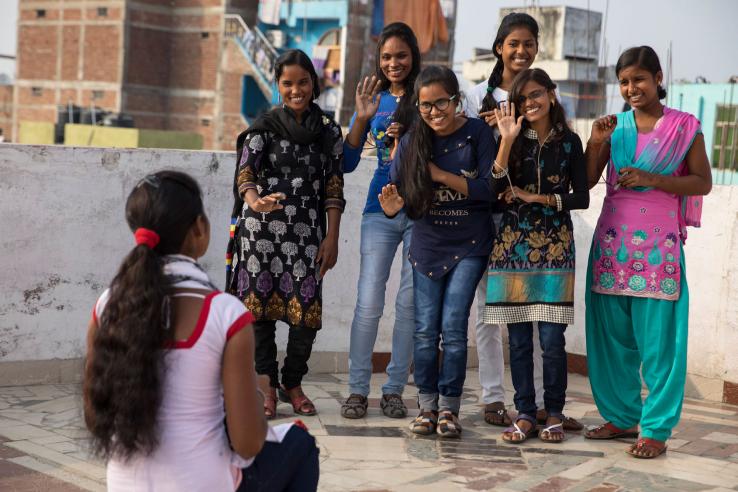June 2018 Newsletter

Changing the calculus of adolescent pregnancy
In 2018, 21 million girls and young women aged 15 to 19 in developing regions are expected to become pregnant. J-PAL’s new policy Bulletin on reducing adolescent pregnancy in developing countries reviews ten randomized evaluations that tested a range of programs: in-school sexual information sessions, job information, skills training, empowerment programs, scholarships and school subsidies, and conditional incentives.
These programs were diverse, but successful interventions all shared a focus on changing adolescent girls’ calculus of costs and benefits of unprotected sexual activity and childbirth. In a video interview, Pascaline Dupas (Stanford University, Co-Chair of J-PAL’s Health sector) discussed the key takeaways from the Bulletin and strategies for policymakers who aim to support adolescents in delaying pregnancy. Read the Bulletin and watch our interview with Pascaline »
Why enroll in the MicroMasters in Data, Economics, and Development Policy?
Norman Simon Rodriguez, a MicroMasters learner from Colombia, shared his experience in a post on the J-PAL blog. “The skills I gained from the MicroMasters program helped open doors for me to pursue new ventures… it’s a lot of work, but well worth it.” Read more »
Meet the finalists of our Health Care Delivery Innovation Competition
J-PAL North America announced the four finalists of its U.S. Health Care Delivery Initiative (HCDI) Innovation Competition. The finalists, united in their work to address the social determinants of health, will receive technical assistance and training from J-PAL and opportunities to meet with researchers in our network. We spoke to the four finalists about their programs and what they hope to learn from rigorous evaluation. Meet our finalists »
FEATURED POLICY INSIGHT
Improving women's representation in politics through gender quotas
Women hold fewer than 25 percent of parliamentary seats worldwide. Gender quotas are one policy tool designed to increase women’s representation in politics, often by reserving a certain number of leadership positions for women. Evidence from eleven randomized evaluations suggests that quotas for women in local government can improve women’s representation in politics, increase provision of public services, and improve perceptions of women as leaders. Read more Policy Insights »
EVIDENCE-INFORMED DECISION-MAKING
Adapting Teaching at the Right Level from India to West Africa
Pratham, the Ministry of National Education of Côte d’Ivoire, the Transforming Education in Cocoa Communities program, and J-PAL Europe are developing the first French pilot of the Teaching at the Right Level (TaRL) educational approach in Côte d’Ivoire. In recognition of the country’s high level of language diversity, this consortium is collaborating with cognitive scientists and speech therapists to ensure materials and activities are appropriately translated for learners. Learn more »
UPCOMING EVENT
September 26–27: Teaching at the Right Level Conference, Johannesburg, South Africa
J-PAL Africa and Pratham will co-host a conference on Teaching at the Right Level (TaRL) in Johannesburg, South Africa, from September 26–27, 2018. The conference brings together education stakeholders from a growing network of TaRL implementers for two days of knowledge sharing and brainstorming geared toward fostering future collaboration. The event marks the launch of a public collection of resources for education ministries and organizations looking to use the TaRL approach. Learn more and apply by July 27 »
UPCOMING TRAINING
October 15–19: Executive Education Course, Evaluating Social Programs, Milan, Italy
J-PAL Europe is offering a five-day executive education course, "Evaluating Social Programs," in Milan, Italy from October 15–19, 2018. The course will teach participants how to use randomized evaluations to scientifically measure the impact of poverty programs and shape better policies. The content is designed for participants from a variety of backgrounds including managers and researchers from governments, international development organizations, foundations, and NGOs, as well as trained economists looking to retool. Learn more and apply by June 30 »
MEDIA HIGHLIGHTS
How do we know if ed tech even works?
Education Week
Money for nothing: the truth about universal basic income
Nature
The entertaining way to behavioural change: Fighting HIV with MTV in Nigeria
VoxDev
J-PAL boosts refugee education
Arab News
For food-aid recipients, information is power
MIT News
NEW RESEARCH PAPERS
The Influence of Randomized Controlled Trials on Development Economics Research and on Development Policy
Abhijit Vinayak Banerjee, Esther Duflo, and Michael Kremer
Unshrouding: Evidence from Bank Overdrafts in Turkey
Sule Alan, Mehmet Cemalcilar, Dean Karlan, and Jonathan Zinman
The Effects of Micro-entrepreneurship Programs on Labor Market Performance: Experimental Evidence from Chile
Claudia Martínez A., Esteban Puentes, and Jaime Ruiz-Tagle
Impacts 2 years after a scalable early childhood development intervention to increase psychosocial stimulation in the home: A follow-up of a cluster randomized controlled trial in Colombia
Alison Andrew, Orazio Attanasio, Emia Fitzsimons, Sally Grantham-McGregor, Costas Meghir, and Marta Rubio-Codina
Radical Decentralization: Does Community-Driven Development Work?
Katherine Casey
Student Coaching: How Far Can Technology Go?
Philip Oreopoulos and Uros Petronijevic
FEATURED JOBS
Senior Policy Associate (Firms), J-PAL Global (Cambridge, MA, US)
Policy Manager (Firms), J-PAL Global (Cambridge, MA, US)
Senior Policy Associate and Donor Liaison (ATAI), J-PAL Global (Cambridge, MA, US)
Policy Manager, J-PAL Africa (Cape Town, South Africa)
Postdoctoral Research Fellow, J-PAL Southeast Asia (Jakarta, Indonesia)